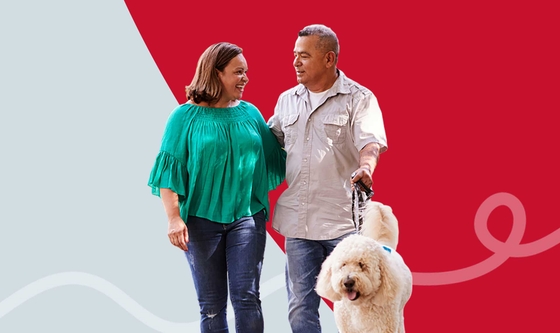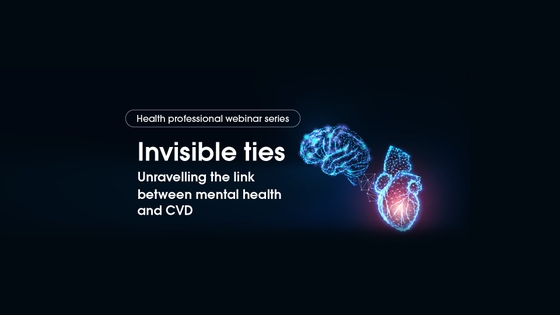
Mental health and cardiovascular disease
Focusing on mental health after a cardiovascular event
Cardiovascular disease (CVD) is an umbrella term that includes heart disease and stroke.
After a heart event or diagnosis, it's common to experience lots of different emotions. You might feel sad, angry, anxious, lonely or confused. This is normal and is often called the 'cardiac blues'. People who have had a stroke can also experience similar emotions.

Learn more about the cardiac blues
Listen to health psychologist Dr Rosemary Higgins from the Australian Centre for Heart Health explain the cardiac blues.
Other emotions you may experience after a cardiovascular event or diagnosis
Listen to health psychologist Dr Rosemary Higgins talk about the signs and symptoms of anxiety and depression, and what to do if you are experiencing them.
To find out more about feelings and emotions after a heart event, including depression and anxiety, visit MyHeart, MyLife.
Learn more about depression and anxiety after a stroke on the Stroke Foundation website.
If your feelings and emotions are not improving or are getting worse, reach out to someone in your healthcare team for help. It’s important to know that you are not alone and that support is available.
Accessing mental health supports
If you have concerns about your mental health, and it is not a crisis, it’s best to see your doctor (general practitioner [GP]). Your doctor will work with you to decide what help you might need. This could include:
- completing a mental health assessment
- creating a mental health treatment plan (MHTP)
- referring you to a psychologist or mental health professional
- discussing prescription medicines to help with depression and anxiety.
A MHTP lets you claim a Medicare rebate on up to 10 sessions with a mental health professional each year. However, some mental health professionals set their own fees, so Medicare may only help cover some of the cost. When booking an appointment, don’t forget to ask how much Medicare will cover, and how much you will need to pay. If they bulk bill, you won’t have to pay anything.
Where to find support
If your emotions are affecting your daily life after a heart event or stroke, seek professional assistance for guidance and support. Check in with your GP and healthcare team to help manage your physical, mental and emotional wellbeing.
For crisis support, call:
- Triple Zero (000), if you are experiencing a mental health emergency
- Lifeline (13 11 14) for confidential crisis support via phone, text or online chat
- 13YARN (13 92 76) for Aboriginal and Torres Strait Islander crisis support
- Suicide Call Back Service 1300 659 467 for a 24/7 Australia-wide phone and online counselling support for people affected by suicide and people experiencing emotional or mental health issues.
For general support:
- access the Cardiac Counselling Clinic of the Australian Centre for Heart Health by calling 03 9326 8544 or registering on australianhearthealth.org.au
- call Head to Health on 1800 595 212 for confidential, non-urgent mental health advice and support or visit Head to Health website for mental health information, services and support
- call StrokeLine at 1800 787 653 or email [email protected] for free, confidential and practical information, advice and support
- access online resources focusing on social, emotional and cultural wellbeing for Aboriginal and Torres Strait Islander Peoples on WellMob
- call or chat online to a counsellor at Beyond Blue on 1300 22 4636 or beyondblue.org.au/get-support/talk-to-a-counsellor/chat.
Support programs available for people who have experienced a heart event or stroke
- MyHeart MyLife - the Heart Foundation’s free support program for people living with heart disease and those who care for them.
Enable Me - the Stroke Foundation’s support program for the Australian stroke community.
Peer support groups
Peer support is a term used to describe a group or community of people with something in common who provide emotional, practical and social support to each other. Joining a peer support group can help you feel less alone. You may also find comfort from sharing experiences and receiving encouragement from others.
- MyHeart MyLife community - an online group to support those living with a heart condition and their loved ones and carers
- Stroke support groups - support groups across Australia for people who have experienced a stroke
Take care of your heart and mind. Print these daily reminders.
Download this help sheet from the National Rural Health Alliance for rural mental health services.
Caring for someone with a mental health condition
A heart event or a stroke can happen suddenly and the road to recovery can be an emotional experience, not just for the individual, but for the person caring for them as well. Becoming a carer can be daunting, especially if you haven’t been in that role before.
Your loved one will need a lot of support. Talk to them about how they’re feeling or coping. You may also want to encourage them to attend counselling, support groups or other services listed above or recommended by their doctor or hospital.
Be aware of your emotions too. Along with positive feelings of love, care and gratitude, it’s normal to feel angry, frustrated or sad. A bit of extra support can make a big difference. If you are unable to get help from friends and family, you might want to access other resources such as the Carer Gateway, Commonwealth Respite and Carelink Centres or reach out to your GP.
The Head to Health website also provides advice for carers on how to support someone with a mental health condition https://www.headtohealth.gov.au/giving-support
Read more about financial support for carers.
For health professionals
With advancements in medical and surgical interventions, people are surviving longer following cardiac events and strokes. However, many survivors of CVD events live with significant co-morbidities, including mental health conditions such as depression and anxiety.1
Mental illness is also increasingly recognised as a risk factor for CVD, with severe mental illness associated with a 37% increase in the risk of cardiovascular events.2 Average prevalence rates for post-cardiac event depression and anxiety are approximately 23% and 29%, respectively.1 Both anxiety and depression have a negative impact on outcomes for cardiac patients, including premature mortality, recurrent events, re-hospitalisations, higher healthcare use, reduced quality of life and poorer adherence to health-enhancing behaviours.1
Australian clinical practice guidelines for mood disorders and anxiety recommend evidence-based lifestyle interventions prior to, or alongside, the prescription of psychological therapy or medication.3,4 The implementation of strategies to manage stress, sleep, social isolation, and loneliness can promote the uptake of positive behaviour modifications.5
Resources
Explore the latest evidence and innovative approaches to delivering mental health support in primary care, including blended care and the evidence base for digital/e-supports. Watch the webinar: https://www.heartfoundation.org.au/events/webinar-invisible-ties-mental-health-and-cvd.
Access InformMe, the Stroke Foundation’s dedicated resource for health professionals to improve stroke care.
About the Mind CVD project
This page is a product of the Mind CVD project, an initiative of the National Heart Foundation of Australia and Stroke Foundation in collaboration with the Australian Centre for Heart Health. The project was funded by the Australian Government Department of Health and Aged Care.
Mind CVD aims to ensure that Australians recovering from a cardiovascular event (including stroke), and their carers, have improved access to information and support for their mental wellbeing.
An initial scoping of the literature and research in people with heart disease and stroke showed that:
- depression and anxiety after a heart event or stroke can negatively impact recovery and quality of life. Reassurance about their future, quality of life and prevention of recurrent events would be beneficial
- a systematic screening for mental health problems after a heart event or stroke is recommended for patients
- physical activity, structured exercise programs and various mind-body activities can improve mental health symptoms and quality of life after a heart event or stroke.
Some of the resources produced as part of the Mind CVD project:
- Your heart and mental health: https://www.youtube.com/watch?v=ftDhtZ-CGO8
- Heart stories: https://www.youtube.com/watch?v=P_FbTG3eJ6U
- Stories from people caring for someone living with heart disease https://www.youtube.com/watch?v=e9gADu_Pxcw
- Wellbeing posters
- Depression and anxiety after stroke factsheet: https://strokefoundation.org.au/what-we-do/for-survivors-and-carers/after-stroke-factsheets/depression-and-anxiety-after-stroke-fact-sheet
References
- Murphy B, Rogerson M, Jackson A. Mental health conditions post-cardiac event and post-stroke: a scoping review. 2022, Australian Centre for Heart Health, Melbourne, Australia.
- Cunningham R, Poppe K, Peterson D, Every-Palmer S, Soosay I, Jackson R. Prediction of cardiovascular disease risk among people with severe mental illness: a cohort study. PLoS One. 2019 Sep 18;14(9):e0221521.
- Andrews G, Bell C, Boyce P, et al. Royal Australian and New Zealand College of Psychiatrists clinical practice guidelines for the treatment of panic disorder, social anxiety disorder and generalised anxiety disorder. Aust N Z J Psychiatry. 2018;52(12):1109-1172.
- Malhi GS, Bell E, Bassett D, et al. The 2020 Royal Australian and New Zealand College of Psychiatrists clinical practice guidelines for mood disorders. Aust N Z J Psychiatry. 2021;55(1):7-117.
- Kwok CS, Kontopantelis E, Kuligowski G, et al. Self-reported sleep duration and quality and cardiovascular disease and mortality: a dose-response meta-analysis. J Am Heart Assoc. 7(15);e008552.
You might also be interested in...

MyHeart MyLife
Your next step towards recovery and living well with heart disease

Managing depression, anxiety and isolation
It's important to get help - the sooner the better

Webinar: Invisible ties - Unravelling the link between mental health and CVD
Cardiovascular disease (CVD) is the leading cause of death worldwide.1 With advancements in medical and surgical interventions, people are surviving longer following cardiac events and stroke.
Last updated18 September 2025